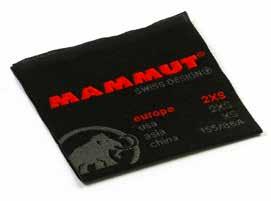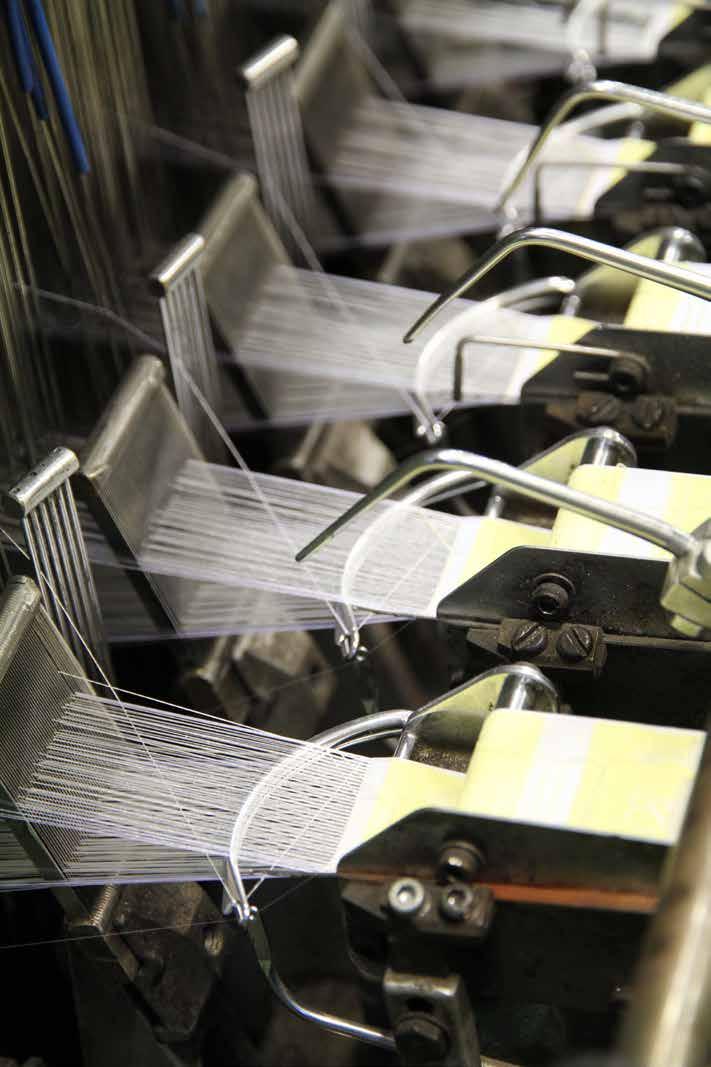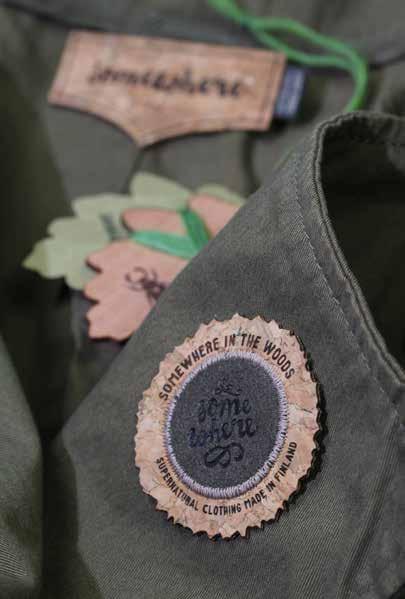
5 minute read
Certifications and materials
What’s in a label?
With our creative labels we help our clients strengthen their brands and products. They are often also a great way to inform the consumer about the product and its origin.
Eco-labels are also a way in which our customers can communicate responsibility along the production chain, making the consumer more aware about their purchases. But that’s not all. We at Nilorngruppen can also certify our products – including labels, buttons, accessories, etc. – according to various environmental labeling schemes.
Eco-labels are voluntary, for the purpose of promoting environmental and social responsibility and helping consumers in making better choices.
Mammut Archiv | Photo: Thomas Senf


bluesign® - An important step towards better and more transparent supply chains
The bluesign® system puts the whole production chain in focus. This is something that we at Nilorngruppen have found to be very well aligned with our own ambitions, and as of 2013 we are a bluesign® system partner. We now aim to incorporate more of our range and volume under bluesign® certification.
bluesign® technologies was founded in Switzerland in 2000. bluesign® certification not only indicates that the product itself is made of materials that are considered more environmentally sound, but that the entire chain of production – from raw natural materials to the finished product delivered to the end consumer – has as little negative environmental impact as possible.
The bluesign® system focuses on resources, people and the environment.
The focus areas are: • Resource productivity • Consumer safety • Water emission • Air emission • Occupational health and safety our customers to join this initiative and choose bluesign® approved products.
Input Stream Management is an important part of the bluesign® system and involves us working towards eliminating all unsustainable substances from production. Input Stream Management is a preventive approach which helps the textile industry produce in a more environmentally friendly and resource-efficient way.
PORTUGAL - HOW WE BECAME CERTIFIED The Nilorn factory in Portugal is a bluesign® system partner as of 2012. The assessment of a factory entails the following steps:
- An evaluation of the production site, focusing on the use of chemicals, the working conditions, environmental impact, and water and energy consumption.
Responsible resource management, i.e. focusing on protecting human health and the environment, shall be the goal for all system partners. A proactive strategy towards clean and transparent production shall be promoted. The best results cannot be achieved within weeks or even months; rather, they represent ongoing efforts for continuous improvement. The road towards sustainable production cannot and should not be travelled alone – it involves collaboration within the whole supply chain network to minimise the product’s life-cycle impact.
We at Nilorngruppen find the increasing focus on bluesign® to be a very positive trend and we welcome more of - Based on the detailed assessment, a report on the findings and an action plan with necessary measures are drawn up.
- Once all necessary measures have been implemented, the products can be approved according to the bluesign® system. These measures could include: eliminating the use of hazardous chemicals, changes in operation, installation of air and water cleaning systems, improvement of personnel safety and an overall improvement in house-keeping.
HONG KONG - NEXT IN LINE The factory in Hong Kong is currently undergoing the assessment, with the aim to become bluesign® system partner in 2017.
Certifications

At Nilorngruppen we also work with other certifications and with different types of more sustainable materials in our products. Here we provide you with the latest insights into some of these certifications and materials.
OEKO-TEX® 100 (class 1)
The STANDARD 100 by OEKO-TEX® is an independent test and certification system for textile raw, intermediate and end products at all stages of processing. Examples of products that can be certified are yarns, woven and knitted fabrics,
accessories such as buttons and labels and readymade articles etc.
The certification aims to provide the end consumer with a reliable, third-party, independent product label for non-hazardous products that are tested in accordance with the STANDARD 100 criteria catalogue and thereby contribute to effective consumer protection. It also aims to support companies in the textile chain based on a scientific criterion catalogue and neutral laboratory tests to help them improve in the product safety area with regard to human ecology.
The OEKO-TEX® tests for harmful substances are fundamentally based on the respective purpose of the textiles and materials, they cover:
These requirements go far beyond existing national legislation. Testing is geared towards how the textile will actually be used, the more closely the product is in contact with the skin, the stricter the requirements. Class 1 is the highest level.
The OEKO-TEX® Association conducts annual control testing of certified products, at a rate of at least 25% of all certificates issued. It tests articles bearing the OEKO-TEX® label that are available in retail shops and also samples of materials from factories. In addition, independent auditors carry out random checks of companies holding OEKO-TEX® certificates, in the form of unannounced inspections.
• legally banned and controlled substances • chemicals known to be harmful to health (but not yet legally controlled) • parameters for health protection
Nilorngruppen holds an OEKO-TEX® certificate for textile production and accessories, produced both in our own factories as well as suppliers’ factories. We hold certification for product class 1, the highest level.

FSC
FSC stands for ’Forest Stewardship Council’, an inter
national non- profit organisation dedicated to promoting
responsible forestry.
FSC certifies forests all over the world to ensure they meet the highest environmental and social standards. Products carrying the FSC label are independently certified to assure consumers that they come from forests that are managed to meet social, economic and ecological needs.
A properly labelled product shall both carry the FSC symbol and the certificate number.
Nilorngruppen products that can carry this label are products produced with the use of paper or forest based textile fibres. Nilorngruppen aims to continuously increase the content of FSC certified paper in our products and we are now able to provide it in all sales markets.
Recycled materials
We are always scouting for new, more sustainable materials for our products.
Recycled polyester is a material that we can offer for
different uses such as woven and printed labels, felt and embroidery. Recycled polyester can also be blended, with a warp in polyester and a weft in, for example, organic cotton. Recycled materials are something we see an
increasing interest in from many customers and we will
continue to develop our ability to offer such materials.










